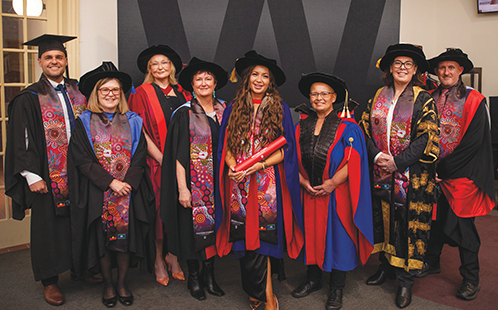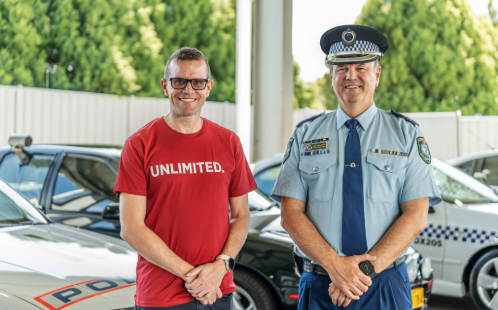Indigenous PhD graduates inspire the next generation of researchers

Western Sydney University celebrated the outstanding achievements of its Indigenous graduates at the recent October graduation ceremonies, which saw 26 Indigenous students cross the stage. This included four Indigenous scholars who received their PhD degrees – a remarkable outcome marking the University’s highest number of Indigenous PhD graduates this year.
Among the PhD graduates were Dr Paul Saunders, Dr Matilda Harry, Dr Madison Shakespeare, and Dr Phillip Good.
Professor Michelle Trudgett, Deputy Vice-Chancellor, Indigenous Leadership, said the cohort’s success highlights the University’s strong commitment to supporting Indigenous excellence and research.
“This nation only graduates around 50 to 60 Indigenous people with doctoral qualifications every year, so the fact that we just had four candidates graduate is a great moment for us to celebrate with our community,” said Professor Trudgett.
“I offer my warm congratulations to Drs Saunders, Harry, Shakespeare and Good, and look forward to seeing the impact these individuals will have in their communities, fields, and careers, inspiring us all.”
The cohort completed PhDs in fields including Indigenous Health and Wellbeing, Indigenous Medical Education, Indigenous Mentoring and Education, and Indigenous Art and Knowledges.
Pro Vice-Chancellor (Research and Innovation), Professor Ian Anderson, commended the graduates on their dedication and perseverance.
“It’s extremely pleasing to see Indigenous scholars excelling at the highest levels of research. Western Sydney University is deeply committed to advancing Indigenous-led research and education,” said Professor Anderson.
Dr Paul Saunders, a proud Biripi man, was among the graduating cohort. He said the milestone marked the culmination of years of research and dedication to improving Indigenous health and medical education.
His thesis, ‘Striving for Aboriginal intercultural development through medical education: A mixed-methods inquiry to understand student transformation’, explored the student experience and transformation within medical education.
“Aboriginal and Torres Strait Islander peoples are underrepresented not only in healthcare, but also within the academy itself,” said Dr Saunders.
“I saw my PhD as a way to change how Aboriginal and Torres Strait Islander health is perceived in medical education and to highlight the strength our communities bring to the healthcare space.” The University’s 2024–2028 Indigenous Research Strategy and future Indigenous Centre of Excellence, are creating opportunities for Indigenous scholars and communities to lead research that is robust, ethical, and grounded in Country.
ENDS
5 November 2025
Photo credit: Sally Tsoutas
Latest News

Western Sydney University partners with NSW Police Force to deliver real-world preparation for one of the state’s most vital public service careers
Western Sydney University is entering a new strategic partnership with the NSW Police Force to help train future police officers to protect, lead and serve their communities in New South Wales.

Opinion: Mushroom murders, riotous mockumentary and a surveillance thriller: what to watch in October
This month’s streaming lineup has plenty to offer, whether you’re chasing thrills, a nostalgic romcom, or some humour to keep you company as you settle in after a long day of work.

Chancellor's Address: Women UNLIMITED Leadership Summit
The following address was deliverd by Western Sydney University Chancellor, Professor Jennifer Westacott AO at the Women UNLIMITED Leadership Summit on Wednesday, 1 October 2025.
Mobile options:

